Hello Europa Universalis music enjoyers (Presumably most of you?). Ryagi back to wrap up our anniversary week with another mod spotlight. And yes that also included wrapping up what have been almost daily announcements here on steam ;D Anniversaries are a busy time!
For this spotlight, we are covering an entire
collection of mods, rather than just one mod. The name "Utopia Music" is ubiquitous within the EU4 modding scene for good reason, and he may not even need an introduction to some of you. But incase you haven't heard of Utopia or the work they've done, we're going to introduce them anyway.
Take it away Runite/Utopia.
------------------------
Hello everyone!
Do you like free stuff? Do you like headbanging and playing in ironman mode? Do you like the EU4 soundtrack and wish there was more of it? I have just the solution for you!
M u s i c Some of you may know me as Utopia, and I compose music for all of your favourite EU4 mods. My work has ranged from
Ante Bellum’s Original Soundtrack, to
Anbennar’s iconic main theme, to an epic
Third Odyssey Christmas ballad. And not to mention: two official music packs for Europa Universalis IV! (
Tenth Anniv. &
HRE Music Pack)
I am also the creator of the
Music Mod Creation Tool[runite-drill.github.io], which is an online tool that can generate a basic music mod for most mainline Paradox Interactive Games.
So, let’s take a look at some of the music I’ve made. And then I’ll give you a little look behind the scenes of the music-making process, using my Roman-themed Christmas song,
We’re Going Back, to demonstrate.
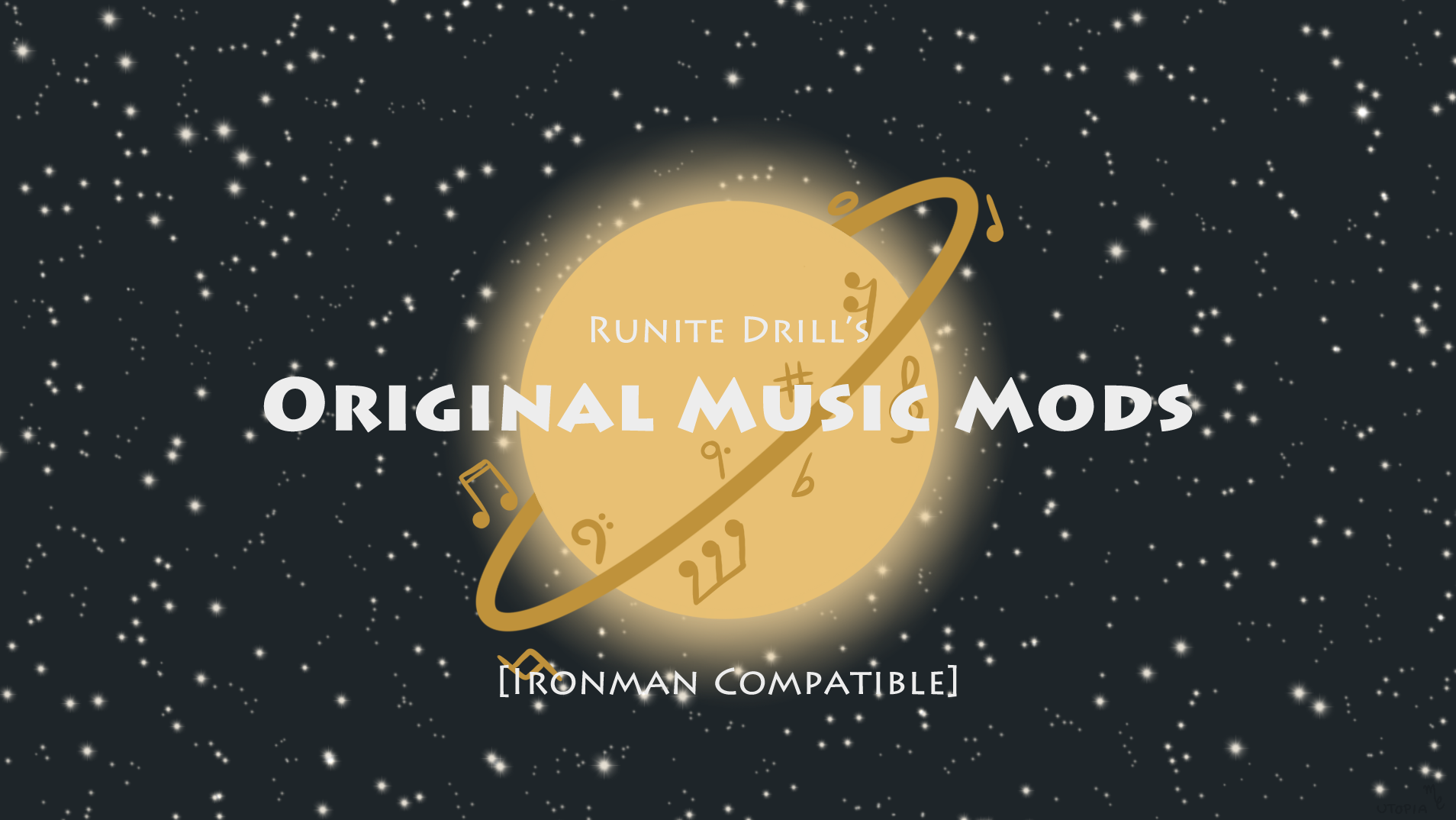
The Collection Original Music Mods is a collection of music mods (surprise!) that together add nearly 100 original orchestral music tracks to the game. Every single one of these tracks has been composed by me specifically for Europa Universalis 4 or one of the Community’s modding projects. And, each track is painstakingly contextualised to the game, to maximise your audio immersion.
There is music to drive the marching drums of war and power your grandest conquests, and there is music to soothe the troubled soul and inspire the quiet harmony of peace. Under the glory of music Kings, Queens and Emperors will rise; Warlords and Chieftains will reign supreme; and decadence will set your enemies adrift. Such are the stories that my music can tell as you play the game.
So, let’s have a look at some of the music available!
Themes of the Old World
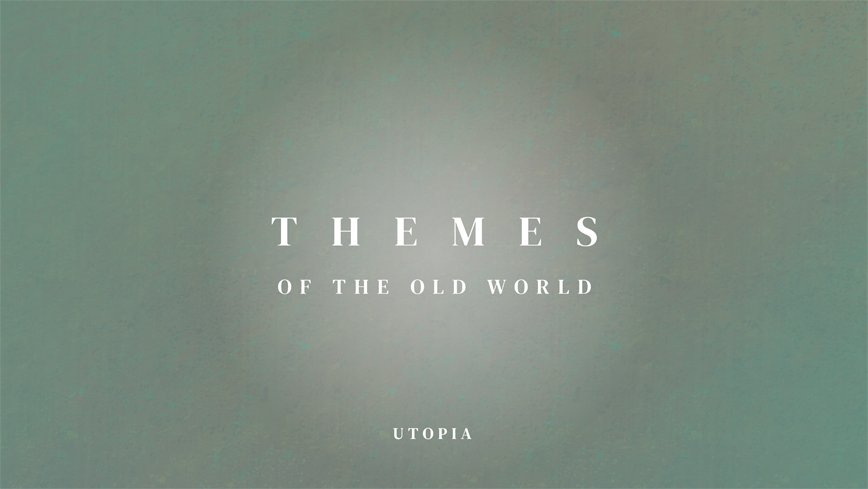
The premier European music mod. Adds 24 new tracks. Each major culture group in Europe receives a peace theme and a war theme. The themes will only play when you interact with a culture (i.e. if you are at war with France you will hear France’s war music). Also includes a bonus theme for Rome if you can keep Byzantium alive.
Steam |
Paradox Mods[mods.paradoxplaza.com] Scandinavia Music Pack
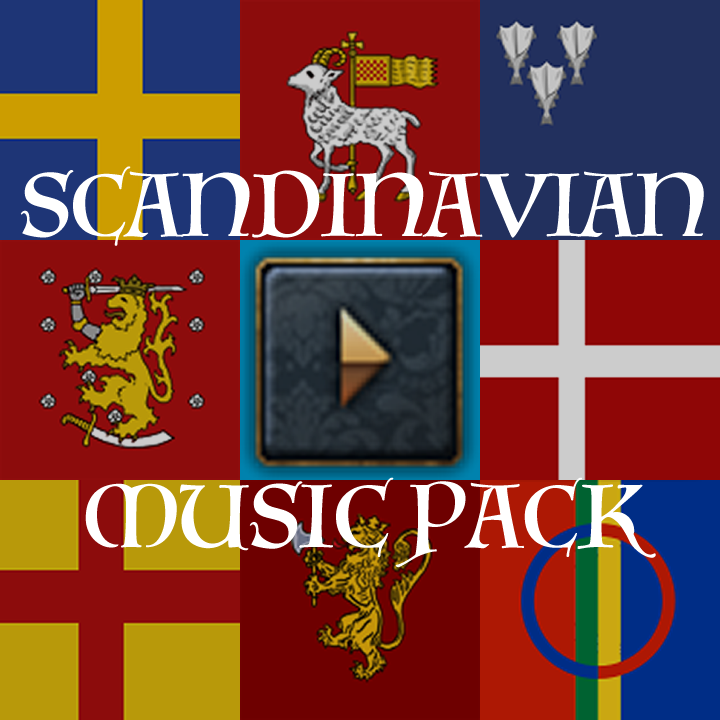
Music for Viking enjoyers. Adds 8 music tracks inspired by and focused on the Nordic countries. You will hear this music if you are active in, and around, Scandinavia. A highlight is the jubilant and celebratory “Coronation of Gustavus Adolphus”.
Steam |
Paradox Mods[mods.paradoxplaza.com] Ante Bellum Original Soundtrack
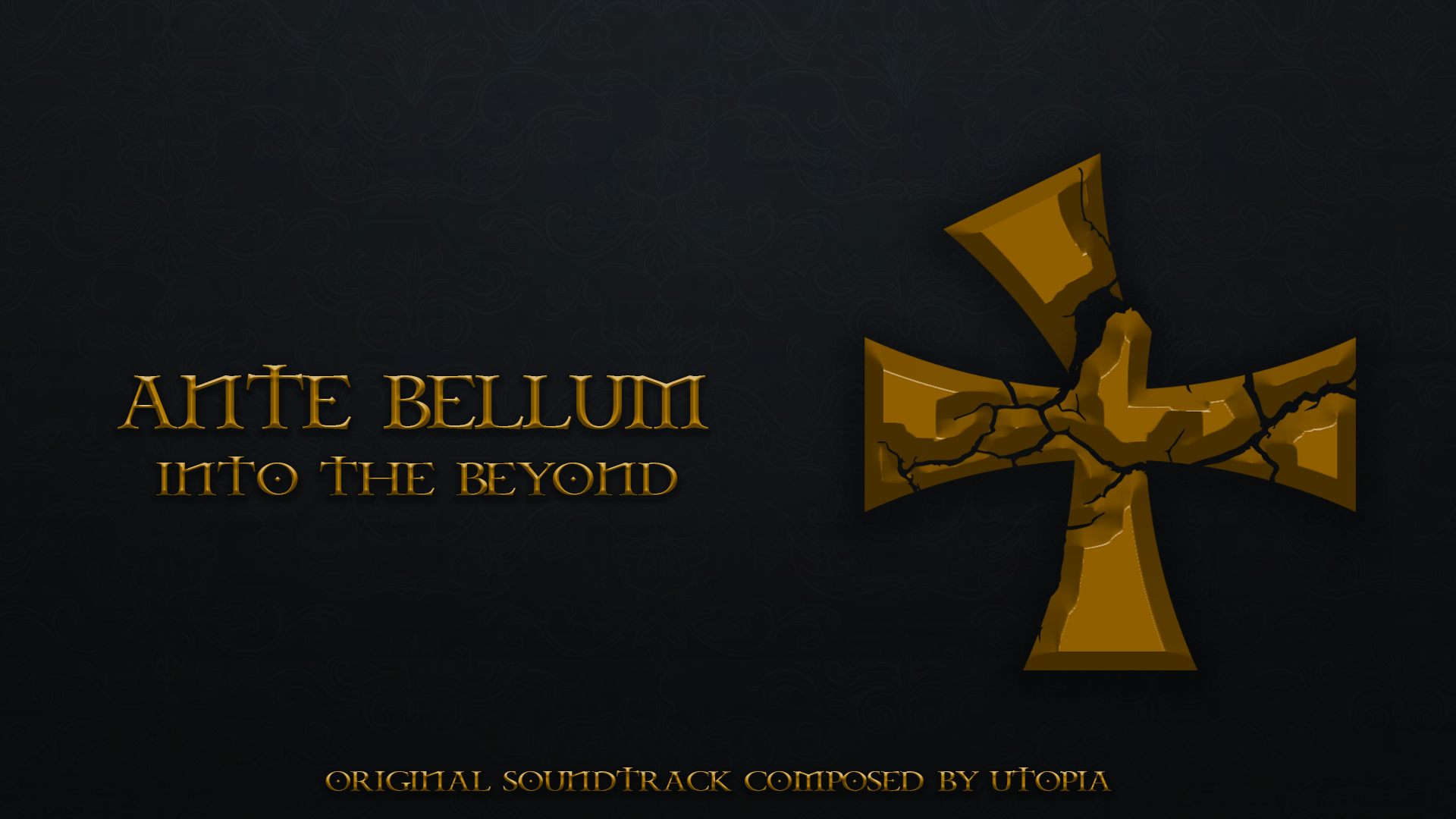
Composed for the Ante Bellum mod. Adds 16 music tracks to the game. Explores the tension and conflicts between the Christian and Islamic religions in the 1400’s, as well as internal strife and decadence. In vanilla EU4 the music is contextualised primarily around region and religion. The main theme is powerful and sets a dark tone for the world, whilst the epic “Legacy of Seljuk” adds a layer of menacing foreboding to the artillery of the Ottomans.
Steam |
Paradox Mods[mods.paradoxplaza.com] Serenades Music Pack
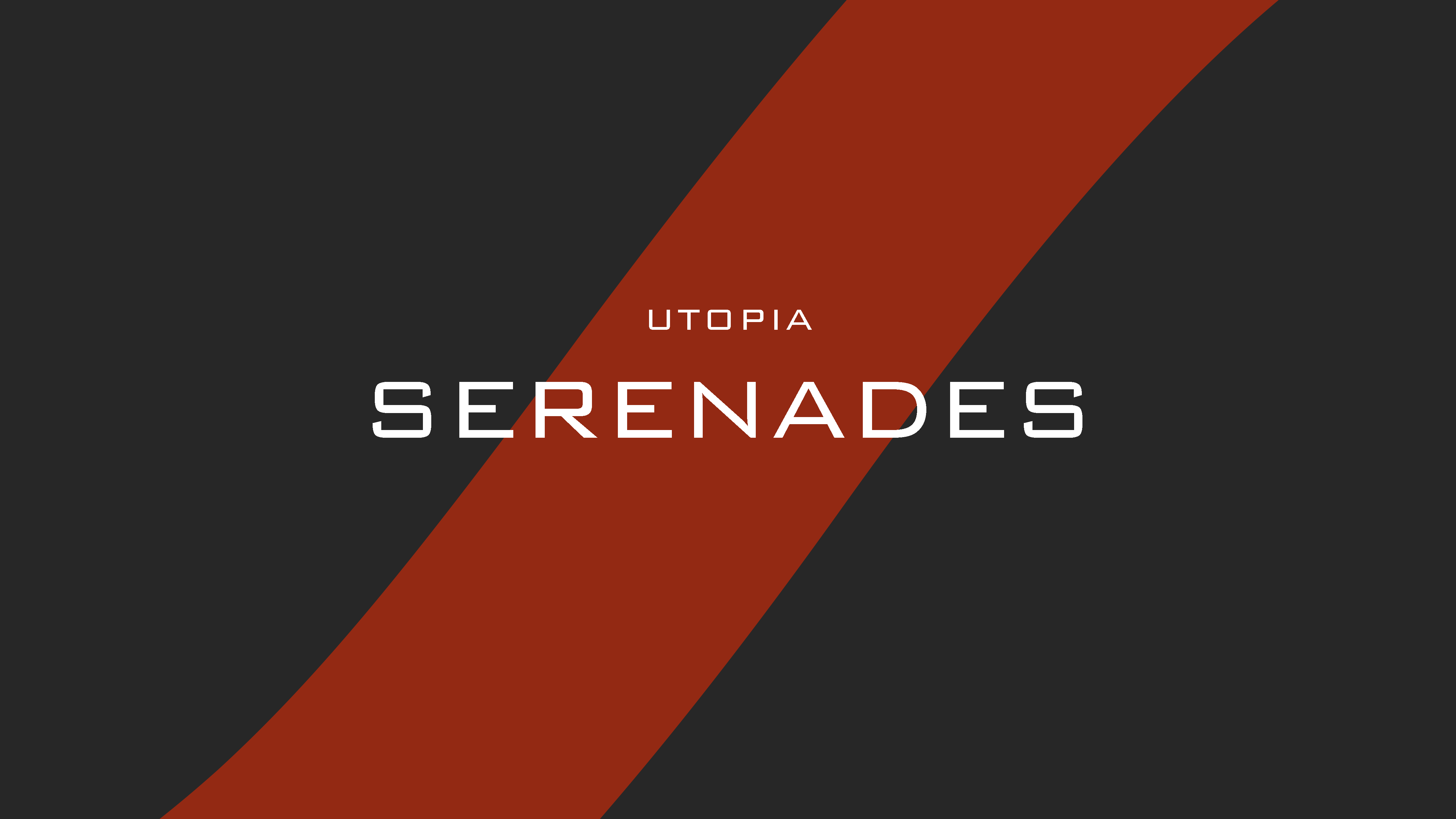
Piano-based peacetime music. Adds 10 music tracks to the game that are relaxed and calming in nature. Plenty of piano and lightweight strings, in comparison to my usual brass-heavy scores. This music is generally contextualised in-game to peacetime.
Steam |
Paradox Mods[mods.paradoxplaza.com] Themes of EU4
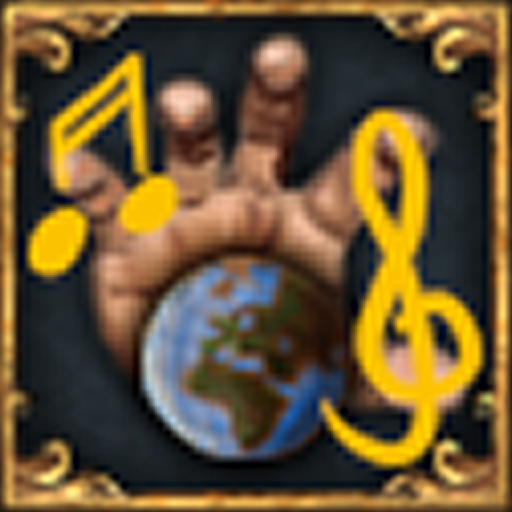
The ultimate collection of miscellaneous music tracks and main themes from across various EU4 mods. Currently adds 27 music tracks to the game and is continually updated whenever new music is released. Includes various music tracks from Anbennar, Third Odyssey and Ante Bellum, as well as main themes for mods such as Extended Timeline and Imperium Universalis, plus a couple of Christmas-themed music tracks! The music is all contextualised depending on the theme of the piece.
Steam |
Paradox Mods[mods.paradoxplaza.com] The Music-Making Process at a Glance By now you might be thinking: all of that music is pretty cool, but how did you make it?
The journey from idea to published music is a long and slow one, and whilst I won’t bore you with the woes of everyday musician life, I thought it could be interesting to take a little look at some of the key parts of the process.
For this demonstration I will be using one of my recent releases “We’re Going Back”, which is an epic-style Christmas song about Byzantium, sung by vocalists Ian Martyn and Nagisa.
We're Going Back ft. Ian Martyn & Nagisa (Third Odyssey - Christmas Theme)

Ideas One of the first steps in the composing process is to find inspiration and come up with some ideas. This can be a simple melody or riff, a rhythmic beat or special harmony, or occasionally something more nuanced and complex. The right idea can set the tone and pace of the overall piece, so it’s important to spend time thinking about what the music represents and the story it’s trying to tell.
For We’re Going Back the scope was clear from the beginning: I wanted to write a Christmas song based on the Third Odyssey mod. This meant I was able to draw upon the musical themes and ideas of the existing main theme, Back to the Motherland. What an epic foundation to build from!
(Back to the Motherland Music Video)

There’s no such thing as a good idea or a bad idea, nor too many or too few. Generally, I sit at my piano for hours recording ideas until I strike something that I feel really resonates with what I’m trying to achieve. Most of the time I’m creating background music, so things need to be somewhat mellow, even when intense, and should blend in well with the game’s existing music. In the case of a main theme I take much more liberty to explore ideas that will make the music stand out on its own. For a Christmas song it’s all about making something more lighthearted.
Now, have a listen to the first idea I came up with when I first started working on We’re Going Back. Do you notice any similarities to the Third Odyssey theme? Any differences?
(WGB: #1 - First Idea) 
I’ve simplified the main fanfare at the end of Back to the Motherland, shifted into a different timing and… added lyrics?! Yes! It’s a Christmas song and when I thought about what the Elysians of Third Odyssey might wish for, a longing “Constantinople” came to mind. This then quickly gave rise to the idea of writing a Michael Bublé style Christmas love ballad about Byzantium.
Usually, I spend a lot of time in this exploratory phase, where some ideas will grow and others will falter. But from the beginning I’m vibing with the concept I’ve come up with for We’re Going Back. It’s unique, catchy and to the point: demonstrating the melody, harmony and rhythm that can then be developed into a much larger orchestral arrangement later. It will also be fun to write some lyrics and vocals!
Development Great! We’ve found an idea that we like. But we need to turn it into a proper song. Now the real work begins!
There’s a few ways to go about this, but generally I find myself taking one of two approaches:
- Plan out the entire song, defining different melodies and rhythms through different sections, all on one or two instruments (often piano). Then start working through to orchestrate it and bring in the other instruments where needed.
- Orchestrate the current ideas and then see where the music feels naturally inclined to go next. A “make-it-up-as-you-go” approach.
For We’re Going Back, I mostly followed approach 1. It’s going to be a “pop” song and those generally have a clearly defined structure (verse, chorus, bridge etc). Melodies are also simpler and more repetitive, which makes it easy to quickly map out the main segments of the song. I can leave some gaps to dream up some instrumental sections later. But alas, lyrics! This is a new challenge. Let’s take a look at the first outline I made for a verse and chorus.
(WGB: #2 - Melodies and Lyrics) 
[MEDIA=youtube]oBBHpPlsJqw[/media]
A new key signature! The melody and harmony are fairly close to the final version. The rhythm is basic and the lyrics are something. Now we just repeat this a few times and we’re done right? Well… it is just a piano, so that’s a bit bland. There’s not even a vocal line yet. I don’t think Michael Bublé would be impressed. It’s time to orchestrate.
I do all of my composing and orchestrating in music notation software (Sibelius 8). This allows me to accurately transcribe note-by-note exactly what I want each instrument to do, and can play it all back to me at will. If that sounds laborious, it is! I usually allow 8 hours to compose 1 minute worth of music.
I spend a lot of time listening to this virtual orchestra and adjusting sounds and melodies and ideas to maintain a smooth flow of music and balance out different sections of music. After all, it would be a bit overwhelming if the entire piece was an over-the-top punchy orchestra from start to finish. Adding variation to the tone, pace and theme of the music can keep things interesting and allow opportunities to advance the musical story that’s being told. In the case of We’re Going Back that also means development of the vocals and what the lyrics are conveying.
Next is an excerpt from the full 3 minute orchestrated draft that I went on to create from the ideas we’ve explored.
(WGB: #3 - Orchestration) 
Christmas songs are fun to write because I can use instruments that would typically lie outside the scope of EU4’s music. I managed to sneak some synths into the 10th Anniversary Music Pack, but in We’re Going Back I’ve kept it modest with some saxophones and guitars. Together they provide a smooth jazz feel to back the vocals in the verse, bringing my original “romantic ballad” idea to life. The orchestra then picks up in the chorus, bringing the epic triumph of the Third Odyssey music in to underscore just how momentous the idea “bringing Rome back” would be. The result is a pretty awesome mashup of genres!
But we also have the vocals. And we can see now there are two vocal lines: one female and one male. Duets tend to make great love songs, but where did this idea come from? Well, a bunch of men thinking about Rome would be a meme. So by turning the song into a duet I could frame it as representative of the people, rather than an individual. That also opened up the opportunity to use more musical techniques on the vocal lines. For the lyrics I had one aim: to guide the music from the inklings of an exiled Elysian dream into an epic Roman reality, in true Third Odyssey fashion.
But even through this there is still experimentation to be had. Ideas come and go. As I build out the full piece, in all of its orchestral glory, sometimes hard decisions have to be made. Or sometimes I get stuck at a point and try a couple different options. The end of a piece is often one of those things. Here’s the original ending I wrote for We’re Going Back:
(WGB: #4 - Alternative Endings) 
Okay. Cool. Sounds moody, I guess. Maybe a little melodramatic? Quite a sudden ending really. Let’s be real, it’s not great. They’re going back to reclaim Constantinople, where’s the epic Third Odyssey fanfare?! Alright, alright, I understand… time for another revision.
Production So, the revisions are done and the orchestration is complete. The music is finished, right? Not yet! Once the composition of the entire piece has been completed it’s time to move into the production phase. This is where the mixing and mastering magic happens to give the music more depth and realism. Besides, we haven’t done any singing yet!
If you thought writing every note one-by-one was tedious, let me introduce you to a whole new level of suffering. In the production process I introduce an entire second layer of the orchestra using a much more vibrant and diverse set of orchestral sounds. But increased flexibility means more work is required to configure each and every note the way I want. That’s right, track-by-track, note-by-note, I crawl through the entire piece again, this time focusing on sound balance, special effects (e.g. synths or niche instruments), and adding more presence to the sound.
Let’s do an audio comparison shall we?
(WGB: #5 - Production) 
We’re Going Back was the first project I mixed in Logic Pro! Here’s what it looks like:
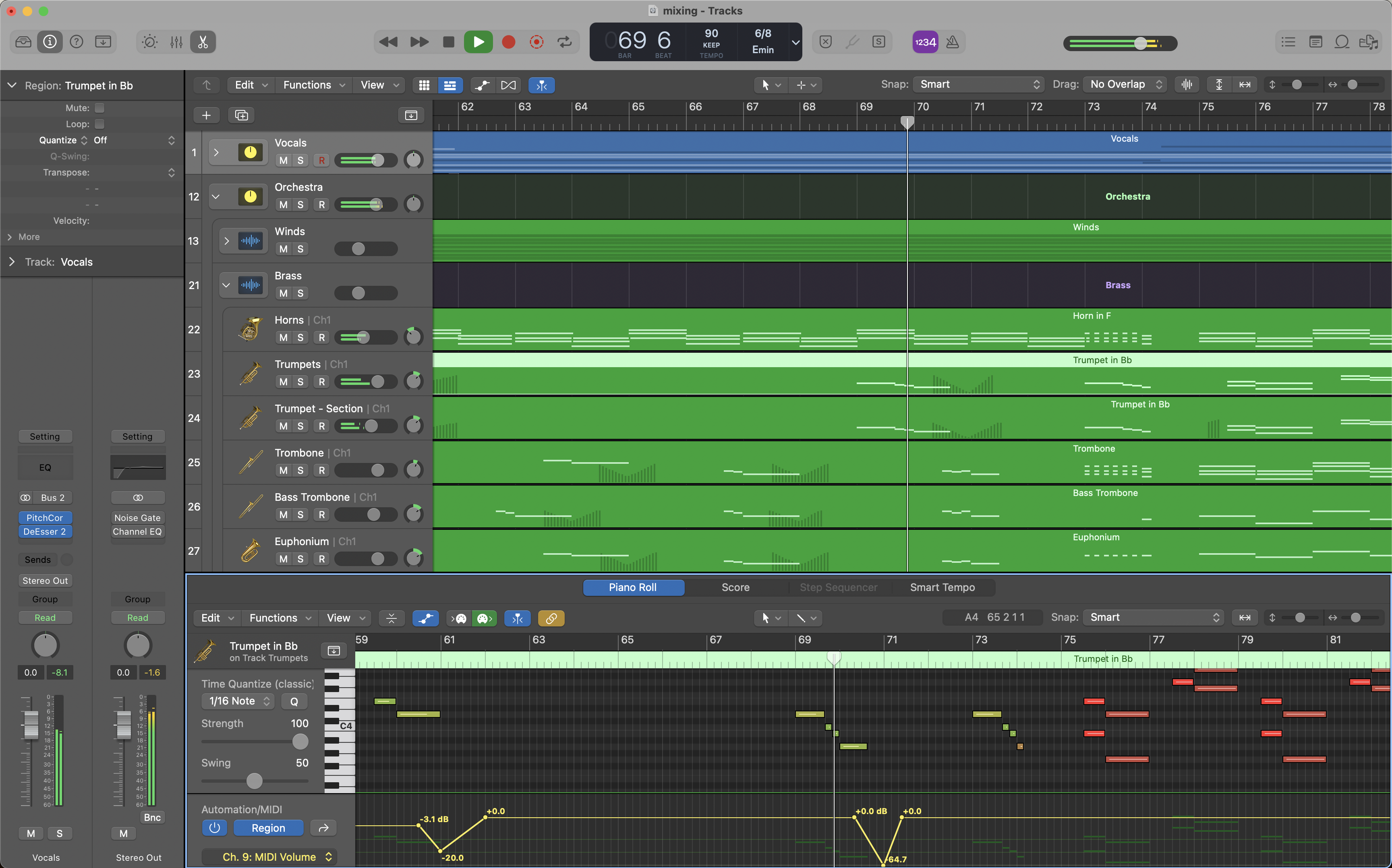
Notice how there’s more lines of trumpets compared to what we’ve previously seen? Every instrument can be played in many different ways, and each one I need manifests itself as a new line in the software. This can easily balloon larger pieces to over 100 lines of instruments - that’s a lot to keep track of and balance all at once!
Now we also need to get the vocals in there. I can’t sing very well, but fortunately I have access to people who can. A massive shout out to
Ian Martyn[linktr.ee] and
Nagisa[vgen.co] for taking on the challenge! I sent them sheet music, audio files, lyrics and various other resources, and they did a perfect job creating audio recordings for both the male and female lines. The eagle-eyed among you will notice that the vocal lines are completely flipped from the original orchestration in the final version of the song; that switch happened after I received the recordings and decided where things worked best.
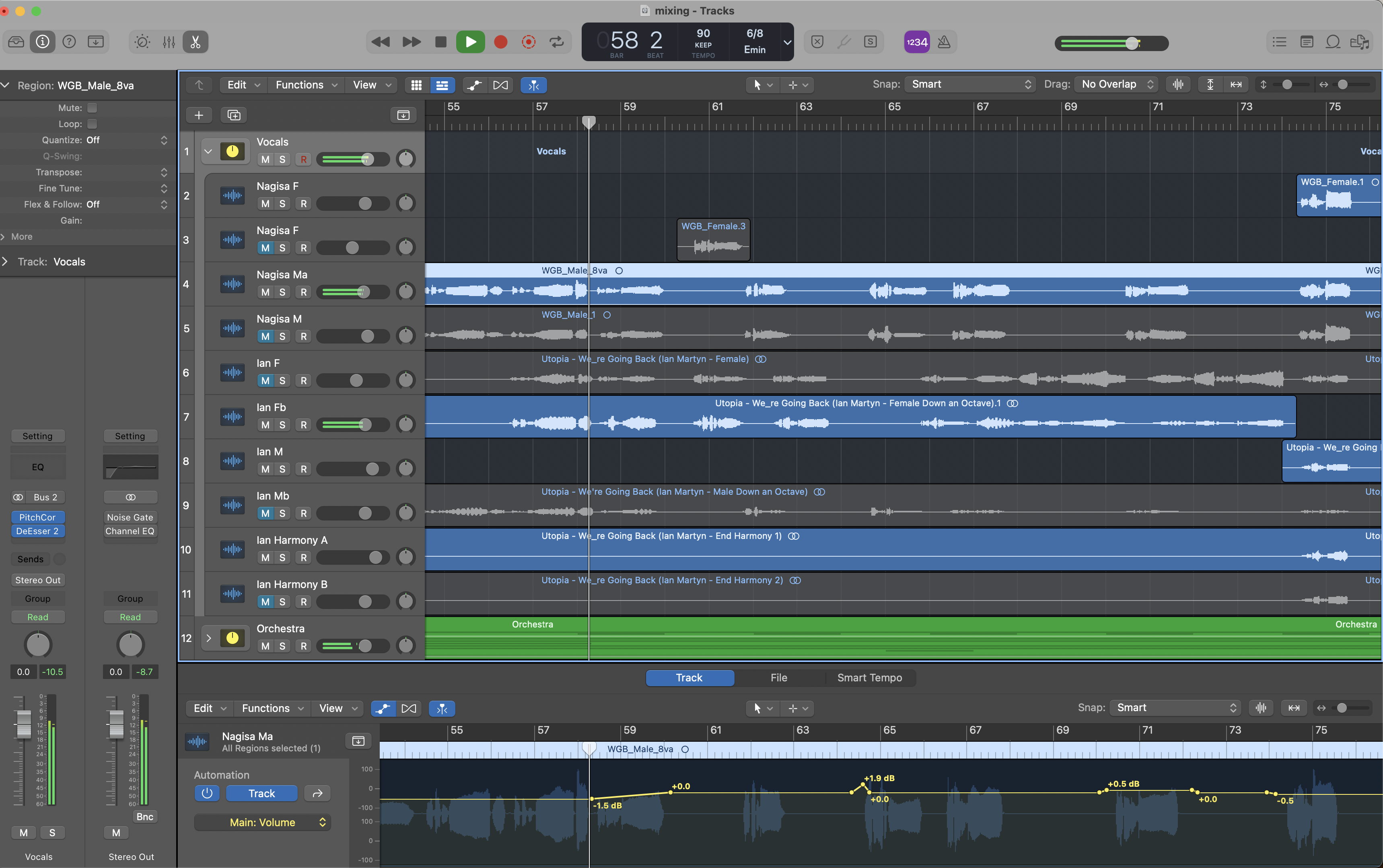
Once I’ve worked through the entire piece, and gotten lost countless times in all the tools that Logic Pro has to offer, it’s time to do the final mixing. This is generally a bunch of final adjustments applied globally to the entirety of the music piece, to prepare it for release and general listening. Volumes are equalised, reverb is added, and anything outlying is squashed by the compressor.
And once that final mix is bounced and ready to go… well then I can finally kick back, relax and enjoy my new piece of music, right? I wish! By the time the music is complete I’ve heard it at least a hundred times already. So instead I get to enjoy it vicariously through the community once I have released it to the world. And don’t even get me started on artwork, social media and marketing…
The End Wow! I hope that was some interesting insight for you. If you’ve enjoyed any of the music, or are curious to discover more, feel free to check out my
YouTube channel, explore my
Spotify [utopiamusic.net]or pop in and say hi on my
Discord server[discord.gg].
And, of course, don’t forget to jump over to
Steam or Paradox Mods and add all of this music to your Europa Universalis IV experience!
Thanks for having me.
See you in Utopia!
- Runite Drill
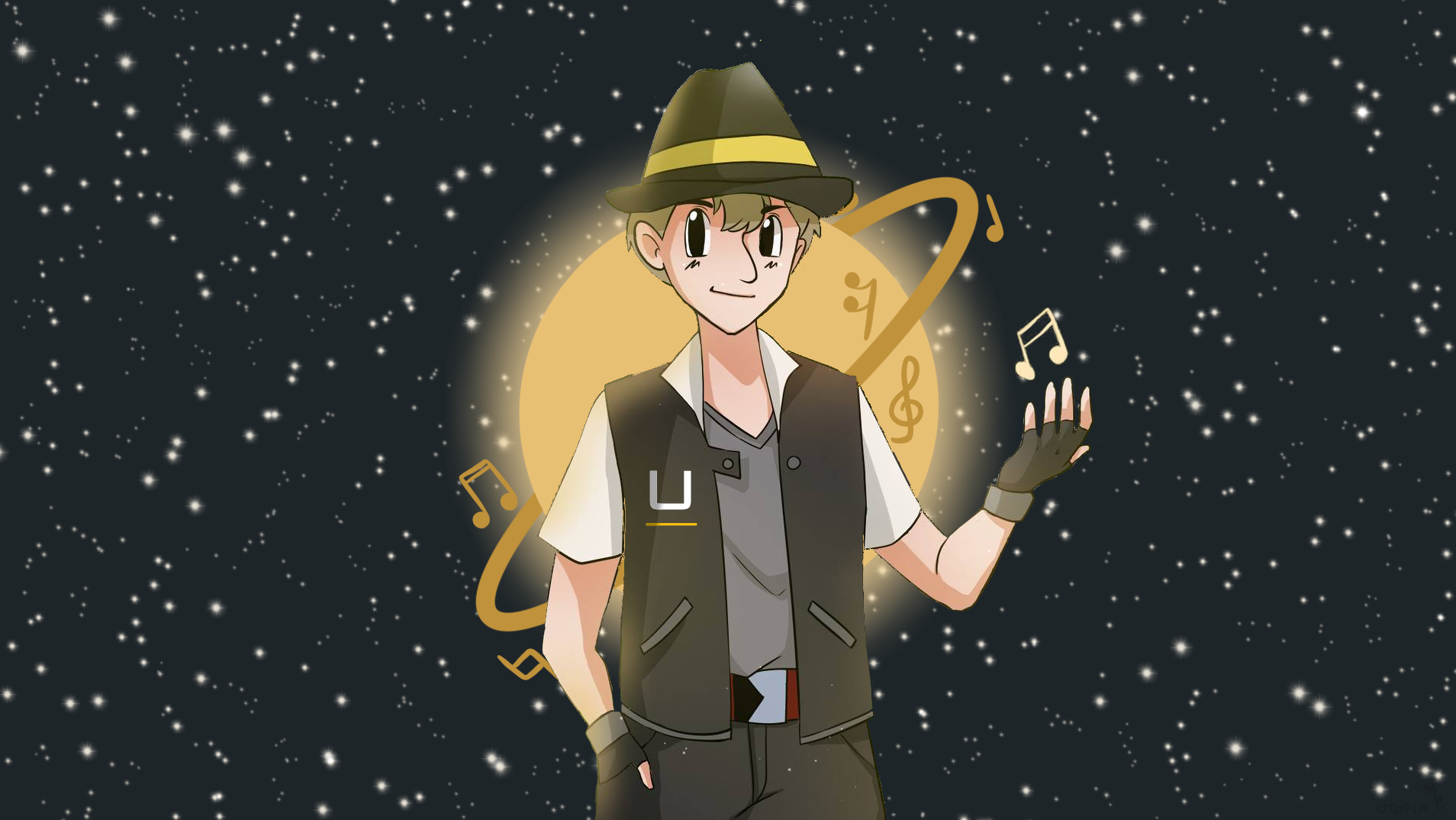
------------------------
Thank you Runite! Europa Universalis wouldn't be what it is without the music behind it. We're all lucky to have Runite bringing high quality soundtracks to our favorite mods. That about rounds out our spotlight this time around. But if you want to hear more from Runite be sure to check out the music collection on
Steam and his other channels linked above.
https://steamcommunity.com/sharedfiles/filedetails/?id=2240429843We also recently released an amazingly silly collaboration with Runite and many content creators. It's available over on our newly launched
Europa Universalis Youtube Channel,
Hunting Accident!
Be sure to check it out if you haven't already:
https://www.youtube.com/watch?v=YCQQP0ZW42MUntil next time o/









 [MEDIA=youtube]oBBHpPlsJqw[/media]
[MEDIA=youtube]oBBHpPlsJqw[/media] 




